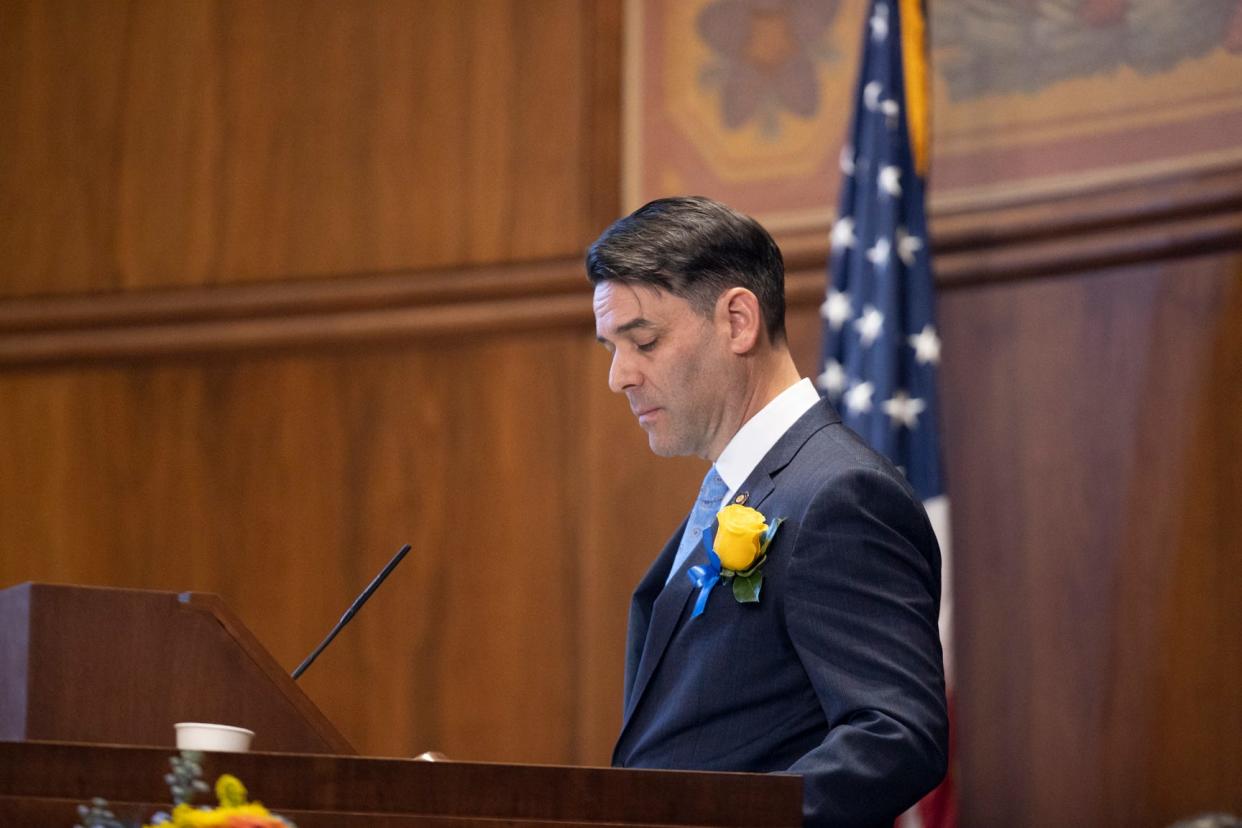Senate president did not discriminate against Republicans during walkout, committee determines

- Oops!Something went wrong.Please try again later.
Oregon Senate President Rob Wagner did not create a hostile work environment or discriminate against Sen. Lynn Findley, R-Vale, and Sen. Cedric Hayden, R-Fall Creek, when he denied their requests to be excused during the 2023 legislative walkout, a Senate Committee on Conduct determined Friday.
Both senators filed complaints to the Legislative Equity Office alleging Wagner's denial violated Rule 27, the Legislature’s personnel rule that prohibits harassment that creates a hostile work environment.
Hayden and Findley are two of the 10 lawmakers who racked up more than 10 unexcused absences during the 2023 legislative session. The Senate chamber failed to reach quorum for six weeks, the longest legislative walkout in Oregon history. Both are now disqualified from running for reelection under the voter-approved Measure 113.
"President Wagner believed the lack of a quorum substantially threatened the Legislative Assembly’s ability to do its critical duty of funding state government. President Wagner concluded the extraordinary-circumstances standard was justified to ensure that the Senate and the Legislative Assembly could fulfill their constitutional roles," wrote Sarah Ryan, a lawyer with the firm Jackson Lewis based in Portland
Ryan was commissioned to conduct an independent investigation to present committee members with findings of fact and evidence related to the complaints.

Unexcused absences denied
Wagner, on the third day of the walkout, said he would only grant excused absences under "extraordinary circumstances."
Hayden requested to be excused from a required Sunday floor session to care for his daughter, who is disabled. The request was denied. He made other similar requests related to caring for his family that were also denied. He also requested to be excused every Saturday to perform his duties as an elder of his church.
Findley requested on May 7 to attend religious services, according to Ryan's report. That request also was denied.
Ryan said very few of the facts were disputed but said Rule 27 is complex.
"Members of the Legislative Assembly … are expected to conduct themselves in a manner that is free of harassment and to discourage all harassment in the workplace and at professional meetings, seminars, or at any event at which the Legislative business is conducted," the rule reads.
Ryan said she looked at other requests for unexcused absences before and during the walkout. While Wagner, D-Lake Oswego, had approved all requests in the first several months of the session, he denied and rescinded approvals beginning May 3.
He approved four requests to be absent, including two related to medical reasons, a request from Sen. Brian Boquist, Dallas, after a water main broke on his property and a request from Senate Minority Leader Tim Knopp, R-Bend, to attend a family funeral.
Ryan determined Hayden and Findley's complaints could not be entirely considered under rule 27. Neither are legislative employees, she said, instead they are elected officials.
While the legislative branch is a place of employment for many, it is not for legislative members, Bor Yang, the new legislative equity officer, further explained during Friday's committee hearing.
Ryan said she determined the only question she needed to look into was whether there had been either a hostile work environment or discrimination based on religion.
"Evidence did not support such a conclusion," Ryan told committee members.
Committee determination
Members of the Senate Conduct Committee, comprised of two Republicans and two Democrats, voted that the evidence presented by the report was not enough to determine Wagner had violated Rule 27.
The committee voted on potential violations on both complaints.
Committee members voted yes in their determination of whether Findley and Hayden belong to a protected class recognized under Rule 27. But they unanimously agreed the evidence did not support Wagner that had subjected Hayden or Findley to a hostile work environment under Rule 27 by engaging in physical or verbal behavior that denigrated or showed hostility toward them.
It is a determination both Hayden and Findley disagreed with.
Hayden did not appear before the committee. He submitted a letter through his attorney.
"Senator Hayden knew when he filed his Rule 27 complaint that a majority of the Conduct Committee — whose members all serve at the pleasure of the Senate President — would almost certainly decline to publicly acknowledge that the Senate President violated Rule 27," wrote lawyer Steve Elzinga.
Wagner's denials are "a textbook example of religious discrimination and retaliation," Elzinga added.
"We submit this letter on behalf of Senator Hayden instead of appearing at the hearing. There is no need for further fact-finding. All that remains is to apply the law."
Findley's statement called the complaint experience the "absolutely worst thing" he has gone through.
Findley said he was appalled to find out he had no recourse as a member of the legislative body and that news media and the public were privy to the process.
"Had I known when I started this process in May that it was going to be fully vetted and fully public and I would be defending myself in the media, I would never have done this," Findley said. "I thought I had some privacy. I do not."
He reiterated his claim that the Senate has become a toxic and hostile environment for members, saying: "I get sick when I walk into the Capitol right now because my stomach knots up."
A lawsuit five Republicans, including Findlay, filed challenging Measure 113 is ongoing. The Oregon Supreme Court will decide whether the challenge that would allow them to seek re-election should be immediately considered in the Supreme Court or remain at the Court of Appeals.
Dianne Lugo covers the Oregon Legislature and equity issues. Reach her atdlugo@statesmanjournal.com or on Twitter @DianneLugo.
This article originally appeared on Salem Statesman Journal: Oregon Republican senators' discrimination complaints closed

